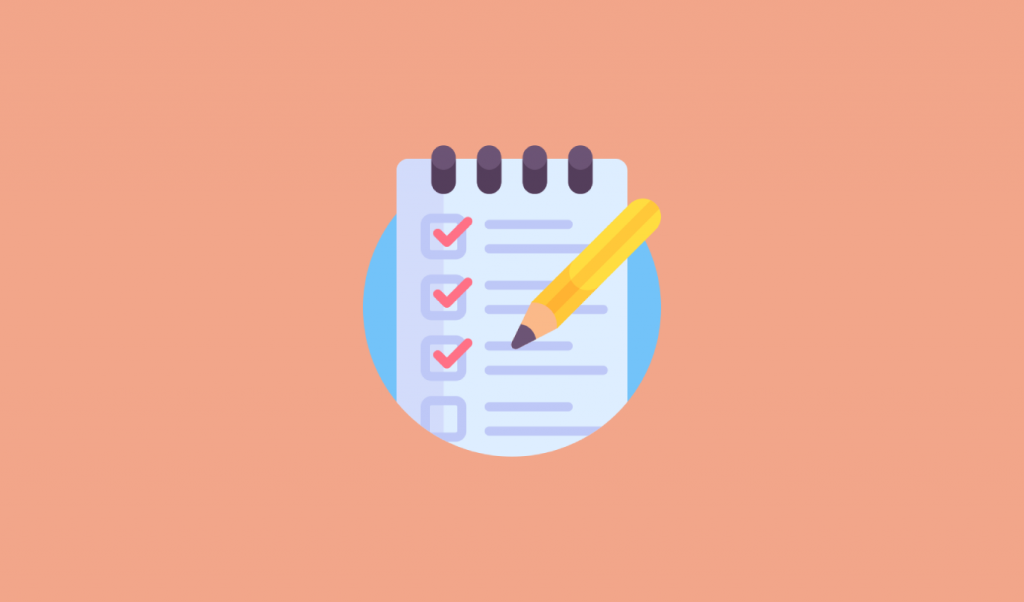Glad you asked! The length of your to-do list has a huge impact on your productivity.
By manipulating the length of your to-do list, you can hack your productivity. The right list length will help you feel less overwhelmed and get more done.
What list are we talking about?
There are two types of to-do lists: endless and finite. The most popular finite list is the daily to-do list, which is what we will discuss in this post. It’s the one you have the most control over and the one that has the biggest impact on your productivity.

How long should your daily to-do list be?
Number of tasks vs. total time
The perfect daily to-do list is one that you can finish.
It is better to make a list that is too short rather than too long. You can always add things when you finish early (which will feel incredible!).
On the other hand, still having open tasks at the end of the day feels really bad. You are also more likely to procrastinate on a long list because long lists trigger overwhelm.
How can I know if my daily to-do list is too long?
When it comes to length we can look at two things: the number of tasks on a list and the total time to complete it.
You should always start with thinking about how many hours long your daily to-do list should be. This number is more or less fixed and the number of tasks you add will be guided by how much time you have.
The number of tasks on your list is important too, of course, but it isn’t fixed like the available time. We get into how to manipulate the task number below.
How many hours should a to-do list take to finish?
Ultimately, our day has limited hours in it. And if we want to finish our daily to-do list we have to consider how many hours we can realistically work on our list so we know how much to put on there.
There are two main factors that determine how many hours we can work on our to-do list each day.
- How many hours are available for working on your to-do list after subtracting time for other commitments, sleep, eating, hygiene, etc.?
- How many hours can you really be productive each day? Mental and physical energy is limited.
Taking both of these things into consideration you should end up with an estimate around 1-8 hours.
Based on that number, it’s a good idea to build in a buffer. The buffer accounts for possible interruptions, inefficiencies switching from task to task, and tasks that we underestimate. So subtract about 20%-30% from your initial time estimate to arrive at your final time total.

Add a time estimate to each task and total it up as you create tasks to make sure you are staying within your allotted time.
How many tasks should you have in your daily to-do list?
OK, so let’s say you figured out that your ideal to-do list for today is about 4 hours long. How many tasks is that?
It depends on how long each task is, of course. This is were it gets interesting.
You can have two lists that include the exact same amount of work and will take you the same amount to complete (4 hours), but that look very different. It all comes down to “task granularity”.
What is task granularity?
Task granularity is all about how much you break down a larger task:
Cook dinner
Low granularity
Make salad
Roast potatoes
Grill chicken
Medium granularity
Wash salad leaves
Chop Tomatoes
Chop cucumbers
Make salad dressing
Peel potatoes
Season potatoes
Put potatoes into oven
Season chicken
Grill chicken
High granularity
Same task, three very different looking to-do lists.
What level of task granularity is the best one?
It depends on the type of task, your personal preference, and your productivity strengths and weaknesses (Can’t focus for long? Have a hard time getting started on big tasks?).
But medium granularity works best for most.
As a guideline: I recommend making tasks that are maximum 1 hour long. If you are struggling with procrastination try to not make tasks longer than 30min.
Also, the more complex your work and the more you are dreading it, the shorter the tasks on your list should be.
Task granularity is an important tool you can use to manipulate your perception of a to-do list. If you notice that a long list overwhelms you but you have no issue getting started on big tasks and staying focused, then go with a high granularity.
If you tend to procrastinate tasks that seem overwhelming and complex, break them down to create many smaller tasks.
Conclusion: How many tasks to put on your daily to-do list
Just give me a number
The average productive human (and most people don’t exactly fall into that category) has about 6 hours of good work in them per day. And a nice granularity level for most people is somewhere in the middle: between 30-60 min for each task. That means a good daily to-do list for an average productive person has between 6-12 tasks on it.
Again, to-do lists are a highly individual thing. Many swear by having only 3 tasks on their list every day (obviously larger tasks) and others do best by having very long and detailed lists. So figure out what works best for you.
Summary
How long should your to-do list be?
- First figure out how many hours you have available in the day to work on your to-do list
- Aim for a list that takes you about 70% of the time that you have available in order to have a built-in buffer
- Use time estimates while planning tasks to make sure you are not exceeding your time limit for the day
- Determine a good level of task granularity to make a list that isn’t overwhelming to you
- Based on averages, a good daily to-do list has about 6-12 tasks on it. But ultimately it is highly dependent on the type of work and person
Share in the comments
Do you use a daily to-do list? How many tasks are usually on there?
Also published on Medium.




